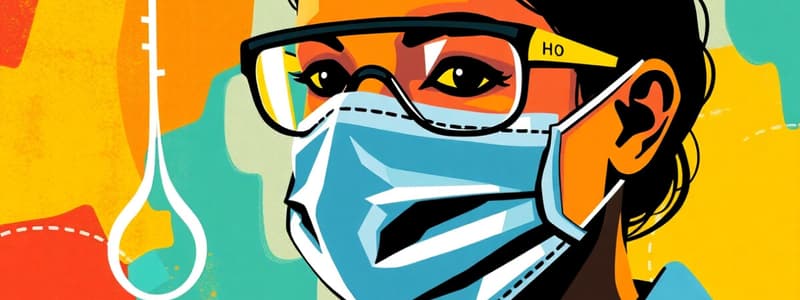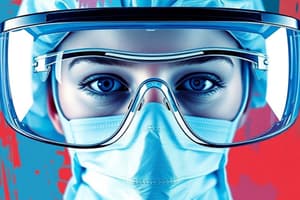Podcast
Questions and Answers
What type of shoes should be worn in the laboratory?
What type of shoes should be worn in the laboratory?
- High heeled shoes for better stability
- Any style of shoes is acceptable
- Shoes with open toes
- Nonporous material with closed toes and heels (correct)
What is recommended for individuals wearing contact lenses in the lab?
What is recommended for individuals wearing contact lenses in the lab?
- Surgical masks
- Goggles or face shields (correct)
- Regular glasses
- No special precautions are needed
Which behavior is prohibited in the laboratory?
Which behavior is prohibited in the laboratory?
- Working with open flames
- Keeping a clean working area
- Eating and drinking (correct)
- Following lab procedures
What should be done with contaminated personal protective equipment (PPE)?
What should be done with contaminated personal protective equipment (PPE)?
Which of the following is considered a chemical hazard?
Which of the following is considered a chemical hazard?
What should never be done in the laboratory to ensure safety?
What should never be done in the laboratory to ensure safety?
How should gloves be removed to avoid contamination?
How should gloves be removed to avoid contamination?
What is the most dangerous thing in any laboratory according to safety guidelines?
What is the most dangerous thing in any laboratory according to safety guidelines?
What is the primary purpose of laboratory safety practices?
What is the primary purpose of laboratory safety practices?
Which feature is essential in laboratory design to prevent slip hazards?
Which feature is essential in laboratory design to prevent slip hazards?
Which personal protective equipment is crucial for protecting the eyes in a laboratory setting?
Which personal protective equipment is crucial for protecting the eyes in a laboratory setting?
What kind of ventilation systems are essential in a laboratory environment?
What kind of ventilation systems are essential in a laboratory environment?
Which laboratory design component is important for ensuring a water supply?
Which laboratory design component is important for ensuring a water supply?
Why should a laboratory incorporate spill control materials?
Why should a laboratory incorporate spill control materials?
In terms of personal safety, which body parts are most commonly subject to injury in the laboratory?
In terms of personal safety, which body parts are most commonly subject to injury in the laboratory?
What is a critical component of laboratory safety equipment?
What is a critical component of laboratory safety equipment?
Which substance is classified as toxic?
Which substance is classified as toxic?
What is the primary risk associated with corrosive substances?
What is the primary risk associated with corrosive substances?
Which of the following is an example of a carcinogenic substance?
Which of the following is an example of a carcinogenic substance?
What symbol represents an oxidizing agent?
What symbol represents an oxidizing agent?
Which substance is considered an irritant?
Which substance is considered an irritant?
What defines an environmental hazard?
What defines an environmental hazard?
Which of the following is a common example of a corrosive substance?
Which of the following is a common example of a corrosive substance?
What is the significance of a biohazard symbol?
What is the significance of a biohazard symbol?
What should be done when diluting an acid?
What should be done when diluting an acid?
Which of the following items requires a biohazard label?
Which of the following items requires a biohazard label?
What is the purpose of a Material Safety Data Sheet (MSDS)?
What is the purpose of a Material Safety Data Sheet (MSDS)?
Which of the following should be included in the MSDS?
Which of the following should be included in the MSDS?
What is a major guideline for chemical disposal?
What is a major guideline for chemical disposal?
Which label must specifically indicate the presence of a radioactive substance?
Which label must specifically indicate the presence of a radioactive substance?
What should not be done when handling chemicals?
What should not be done when handling chemicals?
Why is it important to clearly label chemical containers?
Why is it important to clearly label chemical containers?
What should clinical laboratories do to comply with the new hazard communication Standard?
What should clinical laboratories do to comply with the new hazard communication Standard?
Which of the following actions is necessary when dealing with broken instruments?
Which of the following actions is necessary when dealing with broken instruments?
What should you do if a chemical spills on your skin?
What should you do if a chemical spills on your skin?
What is the correct procedure when a concentrated acid or base spills on the floor?
What is the correct procedure when a concentrated acid or base spills on the floor?
Which is not a recommended action when heating glassware?
Which is not a recommended action when heating glassware?
How should you handle electrical cords and appliances in the laboratory?
How should you handle electrical cords and appliances in the laboratory?
What type of container should biological waste be disposed of in?
What type of container should biological waste be disposed of in?
What should you do with materials safety data sheets (MSDS) in the laboratory?
What should you do with materials safety data sheets (MSDS) in the laboratory?
Flashcards are hidden until you start studying
Study Notes
Laboratory Design
- Doors should be present for both entry and exit
- Lab benches must have a sink with a water supply, and should be U-shaped
- Ventilation system should have windows, fans, fume hoods, and biological safety cabinets
- Lighting levels should be adequate on lab bench and floor level
- Floor drains should be near lab units, floors slopes to the drain minimizes slip hazards
- Labs should have spill control materials, safety equipment like eyewash units, fire blankets and fire extinguishers
Personal Protective Equipment
- Shoes should be nonporous, closed-toe and have a heel
- Contact lenses are discouraged, but goggles or face shields are recommended if contact lenses are worn
- Long hair must be tied back when working with open flames
Behavior in the Lab
- Follow lab procedures exactly and never conduct unauthorized experiments
- Keep working area clean
- Food and drinks are not permitted in the lab
- Smoking is prohibited in the laboratory
- No practical jokes allowed
- All contaminated PPE must be removed and properly disposed of before exiting the laboratory
- Gloves should be removed using the beaking method to avoid contamination
- Do not enter the lab without knowing how to safely use chemicals and identifying them correctly
Laboratory Hazards
- Chemical Hazards:
- All chemical containers should be labeled
- Hazard warning signs should clearly mark areas where flammables, hazardous or toxic chemicals, and carcinogens are stored or used
- Biohazard signs should mark blood and body fluids storage and analysis areas
- The National Fire Protection Association (NFPA) hazard identification system should be clearly understood and followed
- Fire Hazards:
- Know how to use a fire extinguisher
- Sharp Objects Hazard:
- Never catch broken instruments
- Grasp sharp instruments only by the handles or tongs
- Dispose broken glass appropriately
- Electrical Hazards:
- Keep all electrical cords, wires, and appliances away from water
- Physical Hazards:
- Handle equipment carefully
- Do not place personal bags on lab desk or objects on floor
- Biological Hazards:
- Sterilize using an autoclave before getting rid of
- Place in specific biohazard containers
- Heating Hazards:
- Do not point the end of a heated test tube towards self or others
- Do not heat in a closed container
- Heated glassware should be handled with tongs or gloves
- Do not place hot glassware directly in cold water
- Never look into a container when it is heated
Chemical Safety Rules
- Read all labels twice before handling any chemical
- Use only the chemical type and amount specified
- Never touch, taste, or smell a chemical unless instructed
- Never mix chemicals unless instructed
- Transfer chemicals carefully
- When diluting an acid, pour the acid into water, never the other way around
- Consider all chemicals dangerous
Chemical Waste Disposal
- Treat chemicals before disposal in the sewer system
- Acids and bases should be neutralized
- Metal precipitations and safe reduction of strong oxidizers should be carried out when possible
- Pour chemicals in sand pocket or allow water from tap before pouring them into the sink
Material Safety Data Sheet (MSDS)
- It is a major source of safety information for students
- Can be obtained from chemical manufacturer or by developing one for each hazardous agent
Emergency Procedures
- Acid and Base Spills:
- Know how to deal with concentrated acid and base spills
- First aid for skin: rinse with water for 15 minutes, apply local anti-inflammatory drug
- First aid for eyes: use eye wash station
- Spills on Floor:
- Use laboratory spills kit to clean floor
- Dilute the spill with water
- Neutralize with appropriate materials
- Spills on Benches:
- Clean using a similar method as spills on the floor
Important Notes
- Ensure a written hazard communication program is in place
- Educate lab workers on a yearly basis on the interpretation of chemical labels, MSDS, and health hazards
- Maintain hazard warning labels on all containers received or filled on site
Studying That Suits You
Use AI to generate personalized quizzes and flashcards to suit your learning preferences.




